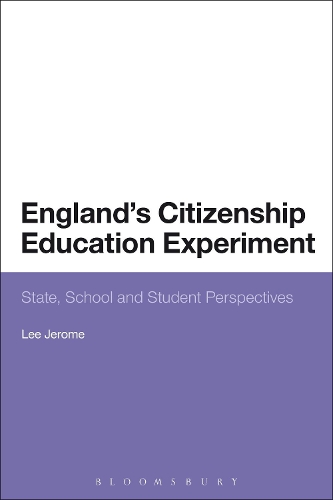
England's Citizenship Education Experiment: State, School and Student Perspectives
(Hardback)
Available Formats
Publishing Details
England's Citizenship Education Experiment: State, School and Student Perspectives
By (Author) Professor Lee Jerome
Bloomsbury Publishing PLC
Bloomsbury Academic USA
25th October 2012
United States
Classifications
Tertiary Education
Non Fiction
Moral and social purpose of education
370.1150942
Physical Properties
Hardback
208
Width 156mm, Height 234mm
581g
Description
How do we prepare young people to understand the complex problems confronting our society and their place as citizens in shaping solutions Until 1997, the contribution of schools to these challenges was ad hoc and uncoordinated, but with the introduction of citizenship education into the National Curriculum in England a new political project began. Between 2002 and 2012, England has become a leading player in the debate about how to induct young people into democracy. Jerome explores the connections between the values promoted by the government and the forms of citizenship promoted through the National Curriculum and considers: What did the politicians want the policy to achieve What kinds of citizens were teachers trying to create What kind of citizens do the young people feel that they have become To answer these questions this book considers a range of evidence from large scale national and international research projects to single school case studies, conducted with student co-researchers. The study illustrates the complexity of policy making and reveals the gap between curriculum policy and implementation.
Reviews
Lee Jerome is well placed to describe the journey that citizenship education has taken; he is rooted in the subject and the initial training of teachers in it. However, what make this book so fascinating is that it not only provides the sweep of the history of citizenship education but puts this into a political context; that of the New Labour period of office Jerome is to be congratulated on this volume. It is highly readable, provocative and informative. -- Chris Waller, Association for Citizenship Teaching * British Journal of Education Studies *
Citizenship was introduced as a statutory subject of study in British secondary schools in 2002, and Jerome (secondary initial teacher education, London Metropolitan U.) looks at the first ten years of experience with it. He investigates what kind of citizenship education the New Labour government had in mind and how it fits in with the party's broader reform and modernization agenda, and what kind of citizenship education actually happened as a consequence of the policy. Among his topics are studying education policy, imagining the new citizen, teaching and learning citizenship, rights and responsibilities, community and diversity, and active citizenship. * Book News Inc *
This is a book that is both highly readable and scholarly. Lee Jerome combines an astute understanding of political theory and of policy with a practitioner's feeling for the realities of schools and classrooms. He uses original and innovative research techniques to gain access to the voices of students and provides a masterly account of a policy enactment that has been observed with interest across the world. * Hugh Starkey, Professor of Education, Institute of Education, University of London, UK *
After ten years of statutory citizenship education in UK secondary schools, Jerome analyses this program of study by delicately weaving together the complex historical, political, educational and pedagogical variables involved. Conversations with teachers and the involvement of students as ethnographic researchers reveal moving, eye-opening, real-life transformations, challenges and complexities of learning and teaching citizenship in the UK. Jerome inspires a series of inclusive, participative and fundamental methodological frameworks for conducting country case studies around the world examining policy and practice of citizenship education. -- Bassel Akar, Assistant Professor of Education, Notre Dame University, Louaize, Lebanon
Lee Jerome provides a scholarly but readable account of the implementation of citizenship education in England which will be of interest both to those who were part of the process and those who are new to it. One innovative feature is the inclusion of student perspectives. * Audrey Osler, Founding Director of the Centre for Citizenship and Human Rights Education, University of Leeds, UK *
Lee Jerome successfully argues that any developments in education cannot be separated from the political context in which policies emerged. Throughout the book he provides evidence and examples to emphasise the importance of always critically examining the prevailing political context This book would be a superb key text for those working in sociology and education research fields who wish to learn more about the impact of political context on citizenship education policy in schools, on teachers and on students. -- Sadia Habib, Goldsmiths, University of London * The Sociological Imagination *
Author Bio
Lee Jerome is Programme Director Secondary Initial Teacher Education at London Metropolitan University, UK.
